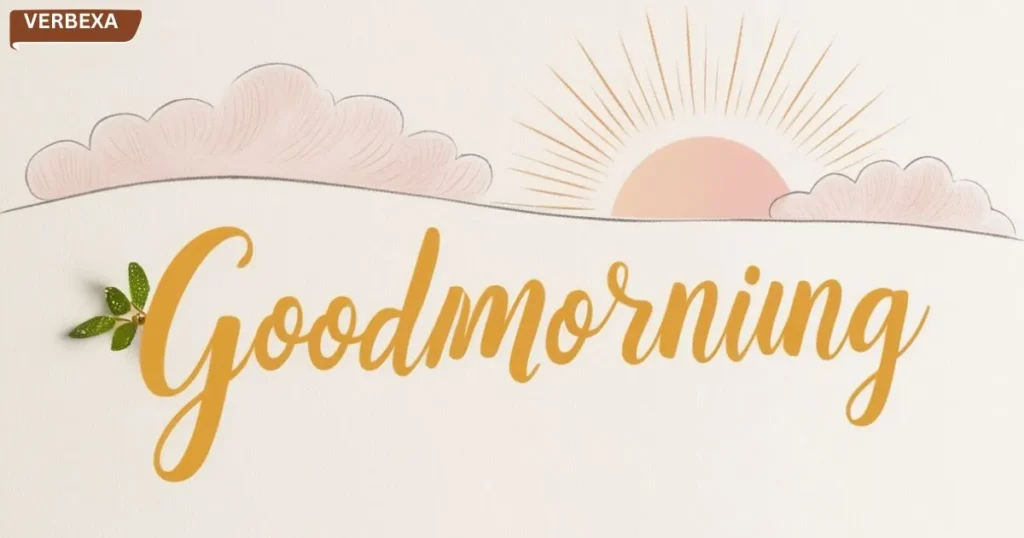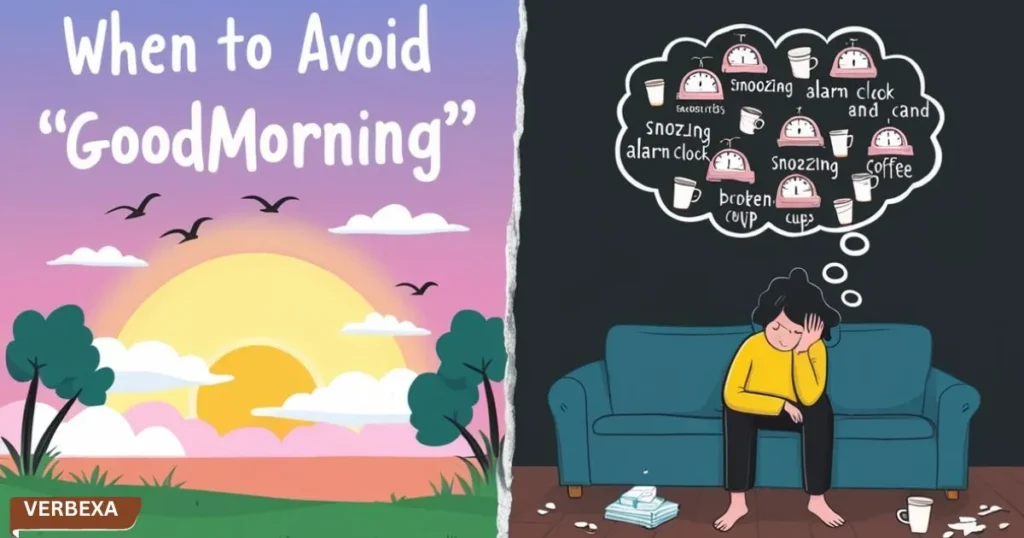Good morning! Or is it goodmorning? Have you ever been unsure about whether to use “goodmorning or good morning” as one word or two? If so, you’re not alone. These two forms are commonly confused, even though they are quite different in grammar and usage. Understanding how and when to use them correctly is important for clear communication.
In this article, we’ll dive into the differences between “goodmorning or good morning” and explore why it matters to get it right. By the end, you’ll confidently know when to use “good morning” and why “goodmorning” is a mistake.
Definitions and Usage: Breaking It Down
To start, let’s look at the meanings and appropriate usage for each term. We’ll explore the definitions and how each word functions grammatically.
“Good Morning” (Two Words)

- Definition: “Good morning” is a standard greeting used in the morning to wish someone a pleasant day ahead. This is a polite, common expression typically used when you first see someone in the morning.
- Grammatical Role: It functions as an interjection or greeting. It’s used in sentences to address someone directly, either verbally or in writing.
Example Sentences:
- “Good morning! How are you today?”
- “I hope you had a restful night. Good morning!”
Usage Tips:
- Good morning is the correct and most widely accepted way to greet someone, whether you’re in a formal or informal setting.
- It’s always written as two separate words.
“Goodmorning” (One Word)

- Definition: “Goodmorning” is a non-standard and incorrect form of the greeting. While it might be used casually or mistakenly, it is not grammatically correct in formal writing or speech.
- Grammatical Role: It is a mistake to treat “Goodmorning” as a single word. The correct form should always be two separate words: “Good morning.”
Example Sentence:
- Incorrect: “Goodmorning! I hope your day is going well.”
Why It’s Incorrect:
- The term “goodmorning” as one word is simply a typographical error. It is not considered an appropriate word in standard English.
Side-by-Side Comparison: Goodmorning vs Good Morning

| Aspect | Good Morning | Goodmorning |
|---|---|---|
| Definition | A standard greeting used in the morning. | A non-standard, incorrect version of “Good morning.” |
| Grammatical Role | Interjection or greeting. | Not grammatically correct (a mistake). |
| Common Context | Used in formal and informal contexts to greet someone in the morning. | Rarely used correctly, usually a typo or misspelling. |
| Standard Usage | Always used as two separate words. | Never used in formal or proper writing. |
| Example | “Good morning! How are you today?” | Incorrect: “Goodmorning! Have a great day.” |
When to Use Each Term: The Right Context
Understanding when to use “Good morning” and avoiding “Goodmorning” is crucial for proper communication. Let’s break down when to use the correct form.
When to Use “Good Morning”

- Formal or Business Settings: In professional emails, meetings, or formal conversations, always use “Good morning”.
- Example: “Good morning, Mr. Johnson. I hope your meeting went well yesterday.”
- Casual Greetings: “Good morning” can also be used in casual, friendly exchanges with family, friends, or colleagues.
- Example: “Good morning! I just made some coffee. Want a cup?”
- Written Communication: Whether it’s an email, a text, or a social media post, “Good morning” should always be written as two separate words.
- Example: “Good morning, everyone! I hope you all had a restful weekend.”
When to Avoid “Goodmorning”

- Never Use “Goodmorning” in Formal Writing: If you’re preparing a professional email, a report, or any official document, “Goodmorning” is incorrect and should never be used. Always write “Good morning” as two separate words.
- Avoid in Published Content: If you’re submitting content for publication, whether it’s a blog post or an article, “Goodmorning” is an error. Always double-check your spelling and grammar.
- Social Media or Texts: Even in casual conversations or social media posts, “Goodmorning” as one word is incorrect. Stick with the grammatically correct form—”Good morning”.
Everyday Usage Examples
To solidify your understanding, here are some common examples where “Good morning” would be the correct choice.
- At Work:
- Email: “Good morning, Sarah. I wanted to confirm the meeting time for this afternoon.”
- Meeting: “Good morning, everyone! Let’s get started with today’s agenda.”
- With Friends or Family:
- Phone Call: “Good morning, Mom! How did you sleep?”
- In Person: “Good morning! What are you up to today?”
- Social Media:
- Post: “Good morning, friends! Wishing you all a wonderful day ahead!”
- Comment: “Good morning! I just finished my workout.”
Now, let’s look at some examples where “Goodmorning” would be incorrect:
- Incorrect Email: “Goodmorning, Rachel. I’m looking forward to our project meeting.”
- Incorrect Text Message: “Goodmorning, John! How’s your day going so far?”
These mistakes make your message look unprofessional or unclear. The correct version is “Good morning”—always.
Why Is It Important to Differentiate?

It’s essential to differentiate between “Good morning” and “Goodmorning” for several reasons:
- Professionalism: In business, using the correct form of common phrases is vital. Mistakes like “goodmorning or good morning” can seem careless or unpolished in professional settings.
- Clarity: Using the right grammar and punctuation ensures that your message is clear to everyone. A phrase like “goodmorning” can confuse the reader because it’s not a recognized word.
- Credibility: Proper grammar helps you appear more credible and authoritative in your communication. Whether you’re in a formal meeting or sending an email, using “Good morning” shows attention to detail.
Frequently asked Questions: Goodmorning or Good Morning
Is it spelled goodmorning or good morning?
The correct spelling is “good morning” as two separate words, not “goodmorning.”
Should it be goodmorning or good morning?
“Good morning” is the proper form, with two words, and “goodmorning” is incorrect.
What is the difference between morning and good morning?
“Morning” refers to the early part of the day, while “Good morning” is a greeting used to wish someone a pleasant start to their day.
Why are goodmorning two words?
“Good morning” is two words because it’s a conventional greeting, and each word serves a distinct grammatical role.
Is goodnight 1 or 2 words?
“Goodnight” is correctly written as one word, unlike “good morning,” which is two.
What is the correct word for morning?
The correct expression for greeting someone in the morning is “good morning,” not “goodmorning.”
What is a fancy way to say morning?
A more elegant or poetic way to say morning could be “dawn” or “sunrise,” which evoke the beauty of the early day.
What is meant by moaning?
Moaning refers to a low sound of discomfort, pain, or pleasure, often expressing distress or contentment.
Is night opposite of morning?
Yes, night is the opposite of morning, as it represents the hours of darkness, while morning marks the start of daylight.
Conclusion: Key Takeaways
To recap:
- “Good morning” is the correct greeting, composed of two words. It’s appropriate in both formal and informal contexts, whether spoken or written.
- “Goodmorning” is incorrect and should always be avoided. It’s often the result of a typographical error or informal usage, but it’s not acceptable in standard English.
By understanding the difference between “Good morning one word or two”, and knowing “is it good morning or goodmorning”, you will always communicate with confidence and clarity. Whether you’re sending an email, greeting a colleague, or chatting with friends, using “Good morning” ensures your message is polished and professional.
Next time you greet someone in the morning, remember: Is it goodmorning or good morning? It’s good morning—and now you’ll know exactly why.

This author is a passionate linguist and grammar enthusiast, dedicated to helping individuals master the art of language. With years of experience in teaching and editing, she brings clarity and precision to every sentence. Tina’s mission is to empower writers of all levels to express themselves with confidence and excellence.

